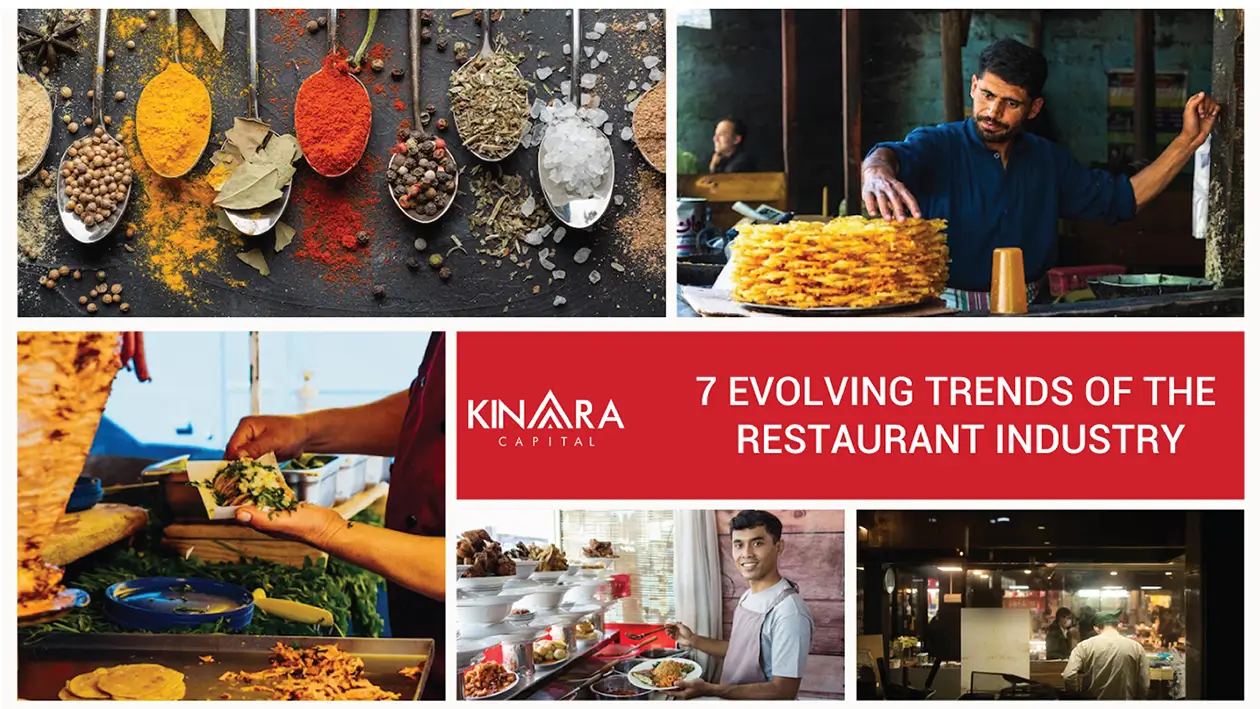
Restaurant industry is an integral part of the broader hospitality sector, focusing on providing food services and offering a space for customers to enjoy their meals. In India, the restaurant industry thrives as a vibrant and dynamic sector, reflecting the country’s diverse culinary traditions and gastronomic delights. With a wide array of regional cuisines, India presents a plethora of dining options, ranging from humble street food vendors to luxurious fine dining establishments. According to a report from the Indian Express, India’s food service market is expected to reach $79.65 billion by 2028 from USD 41.1 billion in 2022, growing at a CAGR of 11.19%.
The restaurant industry plays a vital role in shaping India’s cultural fabric by catering to the varied tastes and preferences of its vast population. Beyond serving delectable food, it serves as a platform for culinary exploration, celebration, and social interaction. Whether during festive occasions, special events, or simply for a satisfying meal, restaurants bring people together, fostering a sense of community.
They contribute to the liveliness of Indian society, enhancing the dining culture and providing opportunities for people. The restaurant industry acts as a gateway to India’s diverse culinary offerings, serving up a vast range of food that reflects the country’s rich heritage and cultural diversity.
The Indian restaurant industry finds its origins deeply embedded in the ancient history of the country. It can be traced back to a time when India served as a crossroads for travellers, traders, and pilgrims from various regions, each carrying its own culinary traditions and influences. These interactions and exchanges led to the emergence of “dhabas,” humble roadside eateries that became vital pit stops, offering nourishment and solace to weary travellers.
As time went by, these simple establishments underwent a remarkable evolution, transforming into specialised restaurants that proudly celebrate and showcase the diverse regional cuisines of India. These speciality restaurants have become the epitome of culinary excellence, offering various flavours, spices, and cooking techniques.
From the succulent kebabs of Lucknow to the rich curries of Kerala, the Indian restaurant industry has flourished as a testament to the nation’s culinary heritage, providing a gateway for both locals and visitors to savour the diverse and authentic tastes of India.

The Indian restaurant industry is truly a treasure trove of culinary diversity. One of its most remarkable aspects is the vast array of flavours and cuisines it encompasses. Each state in India proudly showcases its unique culinary heritage, characterised by a distinct blend of spices, cooking techniques, and flavours. From the indulgent and creamy curries of Punjab to the fiery and tangy delicacies of Andhra Pradesh, and the aromatic and layered biryanis of Hyderabad, every region has its own signature dishes that have found their way onto restaurant menus across the country.
The popularity of Indian cuisine has helped to make India a popular tourist destination. Millions of people visit India every year to savour the country’s unique cuisine. Indian restaurants can also be found in cities worldwide, making it possible for people to enjoy Indian food without ever leaving home.
In addition to attracting tourists, Indian cuisine has also boosted the Indian economy. The food service industry is a major employer in India, generating billions of dollars in revenue each year. Indian cuisine is also a major export, and it is helping to promote Indian culture and tourism. The Indian restaurant industry continues to thrive by delighting diners with its rich tapestry of flavours, serving as a cultural ambassador for India’s diverse culinary heritage.
The restaurant industry is constantly evolving, driven by changing consumer preferences, technological advancements, and societal shifts. Some of the prominent trends shaping the restaurant industry include:
Restaurants are increasingly adopting technology to enhance the customer experience. This includes online ordering systems, mobile apps for reservations and payments, self-service kiosks, and digital menu boards. Technology also plays a significant role in streamlining operations, such as inventory management and kitchen automation.
There is a growing focus on sustainability and eco-consciousness in the restaurant industry. Consumers are increasingly seeking establishments that have implemented environmentally friendly practices, including the use of locally sourced ingredients, reducing food waste, implementing composting and recycling programs, and offering plant-based or sustainable protein options.
The rise of third-party delivery platforms and the convenience-driven culture has led to an increased emphasis on delivery and takeout services. Many restaurants are partnering with delivery services or developing their own delivery networks, like Swiggy and Zomato, to meet customer demand for off-premise dining options.
As consumers become more health-conscious, there is a greater demand for healthier menu options. Restaurants are responding by offering plant-based and vegetarian dishes, catering to specific dietary needs (gluten-free, keto, etc.), and providing nutritional information on their menus.
Customers increasingly seek personalised dining. Restaurants are leveraging technology to offer customisable menu items, allowing customers to tailor their meals according to their preferences. This includes build-your-own dish or meal options, dietary substitutions, and interactive menus.
The emergence of virtual restaurants and ghost kitchens is revolutionising the restaurant industry. Cloud kitchens operate solely through online platforms, focusing on delivery and takeout, while ghost kitchens are facilities designed specifically for delivery-only operations, often hosting multiple restaurant concepts under one roof.
Social media platforms have become powerful restaurant marketing tools. The industry is leveraging platforms like Instagram and TikTok to showcase visually appealing dishes, engage with customers, and build brand awareness. Influencer marketing and user-generated content also play a significant role in driving restaurant visibility and attracting new customers.
These evolving trends reflect the changing landscape of the restaurant industry as businesses adapt to meet consumer expectations, embrace technology, and prioritise sustainability and customisation. Staying abreast of these trends is crucial for restaurants to remain competitive and relevant in the ever-evolving market.
MSMEs, or micro, small, and medium-sized enterprises, play an important role in the restaurant industry. They provide jobs, offer variety, are flexible, and are community-oriented. They also benefit from government support and recognition, and they help to create a level playing field in the industry. Here are some of the reasons why MSMEs play an important role in the restaurant industry.

MSMEs are responsible for introducing new and innovative concepts to the restaurant industry. They are often the first to experiment with new flavours, ingredients, and cooking techniques. This helps to keep the restaurant industry fresh and exciting, and it also helps to create new jobs and opportunities.
MSMEs are more flexible than large corporations, which allows them to adapt to changes in the market more quickly. This makes them more resilient to economic downturns, and it also allows them to respond to the needs of their customers more effectively.
MSMEs are often rooted in their communities, which gives them a strong sense of social responsibility. They are more likely to support local businesses and charities, and they are more likely to give back to their communities in other ways.
Governments often have specific schemes and incentives in place to promote the growth of MSMEs, such as access to loans, tax benefits, and subsidies. Being recognised as an MSME allows restaurants to avail themselves of these opportunities, which can significantly contribute to their success and sustainability.
Classifying restaurants as MSMEs can help create a level playing field and facilitate fair competition within the industry. It enables policymakers to design tailored policies and regulations that address the unique requirements of the restaurant sector, promoting a conducive business environment.
Non-Banking Financial Companies (NBFCs) have become an important source of financial assistance for MSMEs in the restaurant industry, particularly when it comes to addressing equipment needs such as the lack of machinery. These firms specialise in providing quick and accessible financing solutions, filling the gap left by traditional banks and financial institutions.
For MSMEs in the restaurant industry facing challenges related to the lack of machinery, last-mile lending firms like Kinara Capital offer a convenient and efficient way to access loans. These business loans can be utilised to purchase essential equipment, including refrigerators, which play a vital role in preserving food items and maintaining quality standards.
One of the key advantages of seeking financial assistance from Kinara is its flexible lending criteria and simplified application processes. Kinara has faster approval times, allowing MSMEs to access the funds quickly and address their immediate equipment needs. By utilising loans from Kinara, MSMEs in the restaurant industry can invest in refrigerators and other machinery.
This enables them to enhance their operational efficiency, improve food storage capabilities, and maintain the quality and freshness of their ingredients. With reliable refrigeration systems in place, MSMEs can ensure compliance with food safety standards, minimise wastage, and offer consistent and high-quality products to their customers.
For instance, Preeti Khanvilkar, the owner of Maratha’s Spices & More in Vadodara, Gujarat, needed a refrigerator for her restaurant but lacked the financial resources to make such a significant investment. Despite being rejected by multiple lenders, she discovered Kinara Capital, which proved to be the solution she had been searching for. Preeti applied for a loan, and within a remarkably short period of 4 to 5 days, the paperwork was completed, the loan was processed, and the funds were disbursed. This enabled her to purchase the required fridge and cover other essential expenses, facilitating the growth of her business.
The restaurant industry in India is a vibrant and ever-evolving sector that showcases the country’s rich culinary heritage and cultural diversity. It is a dynamic landscape where traditional flavours meet innovative concepts. India’s restaurant industry offers a wide range of cuisines, each reflecting the unique ingredients and cooking techniques of different regions across the country. From the fiery flavours of the North to the aromatic spices of the South, and from the coastal seafood delicacies to the hearty vegetarian dishes, Indian cuisine is a treasure trove of flavours.
Moreover, the restaurant industry in India has also embraced innovation and technology. From food delivery platforms to online reservation systems, restaurants have adapted to the changing consumer behaviour and preferences, making it more convenient for customers to enjoy their favourite meals.
The restaurant industry in India is not just about satisfying hunger; it is about celebrating the country’s culinary heritage, exploring new flavours, and creating memorable moments. It is a testament to the rich cultural fabric of the nation and its love for good food. With its constant evolution and commitment to culinary excellence, the Indian restaurant industry continues to delight food enthusiasts and contribute to the country’s vibrant food scene.
Kinara Capital stands out as one of the leading last-mile lending firms in India, dedicated to making a positive impact on the fastest-growing economy in the world. Committed to promoting financial inclusion in the MSME sector, Kinara empowers small businesses to unlock their growth potential through innovative lending solutions. With an impressive track record of disbursing unsecured business loans, Kinara has earned the trust of numerous MSMEs nationwide. The company’s extensive network comprises 133 branches, ensuring accessibility to even the most remote areas of India.
Applying for a business loan from Kinara Capital is seamless, whether through their official website or the user-friendly myKinara digital app. Also, we have a dedicated customer support team available between Monday – Friday (9.30 AM – 6.00 PM) at our toll free number 1800-103-2683 for any questions or assistance. This ensures that entrepreneurs can get the help they need throughout the loan process. With Kinara Capital, MSMEs gain access to the funding they need to drive business growth and contribute to India’s economic development. Don’t wait any longer. Take a step towards your business aspirations by applying for a business loan from Kinara Capital today!
